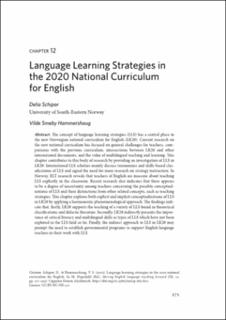| dc.contributor.author | Schipor, Delia | |
| dc.contributor.author | Hammershaug, Vilde Smeby | |
| dc.date.accessioned | 2023-01-31T11:29:52Z | |
| dc.date.available | 2023-01-31T11:29:52Z | |
| dc.date.created | 2022-08-17T10:34:36Z | |
| dc.date.issued | 2022 | |
| dc.identifier.citation | Schipor, D., & Hammershaug, V. S. (2022). Language Learning Strategies in the 2020 National Curriculum for English. I M. Dypedahl (Red.), Moving English Language Teaching Forward: Festschrift to Ragnhild Elisabeth Lund (s. 271–294). Cappelen Damm Akademisk. | en_US |
| dc.identifier.isbn | 9788202769307 | |
| dc.identifier.uri | https://hdl.handle.net/11250/3047368 | |
| dc.description.abstract | The concept of language learning strategies (LLS) has a central place in the new Norwegian national curriculum for English (LK20). Current research on the new national curriculum has focused on general challenges for teachers, comparisons with the previous curriculum, intersections between LK20 and other international documents, and the value of multilingual teaching and learning. This chapter contributes to this body of research by providing an investigation of LLS in LK20. International LLS scholars mainly discuss taxonomies and skills-based classifications of LLS and signal the need for more research on strategy instruction. In Norway, ELT research reveals that teachers of English are insecure about teaching LLS explicitly in the classroom. Recent research also indicates that there appears to be a degree of uncertainty among teachers concerning the possible conceptualizations of LLS and their distinctions from other related concepts, such as teaching strategies. This chapter explores both explicit and implicit conceptualizations of LLS in LK20 by applying a hermeneutic phenomenological approach. The findings indicate that, firstly, LK20 supports the teaching of a variety of LLS found in theoretical classifications and didactic literature. Secondly, LK20 indirectly presents the importance of critical literacy and multilingual skills as types of LLS which have not been explored in the LLS field so far. Finally, the indirect approach to LLS in LK20 may prompt the need to establish governmental programs to support English language teachers in their work with LLS. | en_US |
| dc.language.iso | eng | en_US |
| dc.publisher | Cappelen Damm Akademisk | en_US |
| dc.relation.ispartof | Moving English language teaching forward : Festschrift in honor of Ragnhild Elisabeth Lund | |
| dc.relation.uri | https://press.nordicopenaccess.no/index.php/noasp/catalog/view/166/886/7192 | |
| dc.rights | Attribution-NonCommercial-NoDerivatives 4.0 Internasjonal | * |
| dc.rights.uri | http://creativecommons.org/licenses/by-nc-nd/4.0/deed.no | * |
| dc.title | Language Learning Strategies in the 2020 National Curriculum for English | en_US |
| dc.type | Chapter | en_US |
| dc.description.version | publishedVersion | en_US |
| dc.rights.holder | © 2022 The author(s). | en_US |
| dc.source.pagenumber | 271-294 | en_US |
| dc.identifier.doi | https://doi.org/10.23865/noasp.166 | |
| dc.identifier.cristin | 2043730 | |
| cristin.ispublished | true | |
| cristin.fulltext | original | |
| cristin.qualitycode | 1 | |

